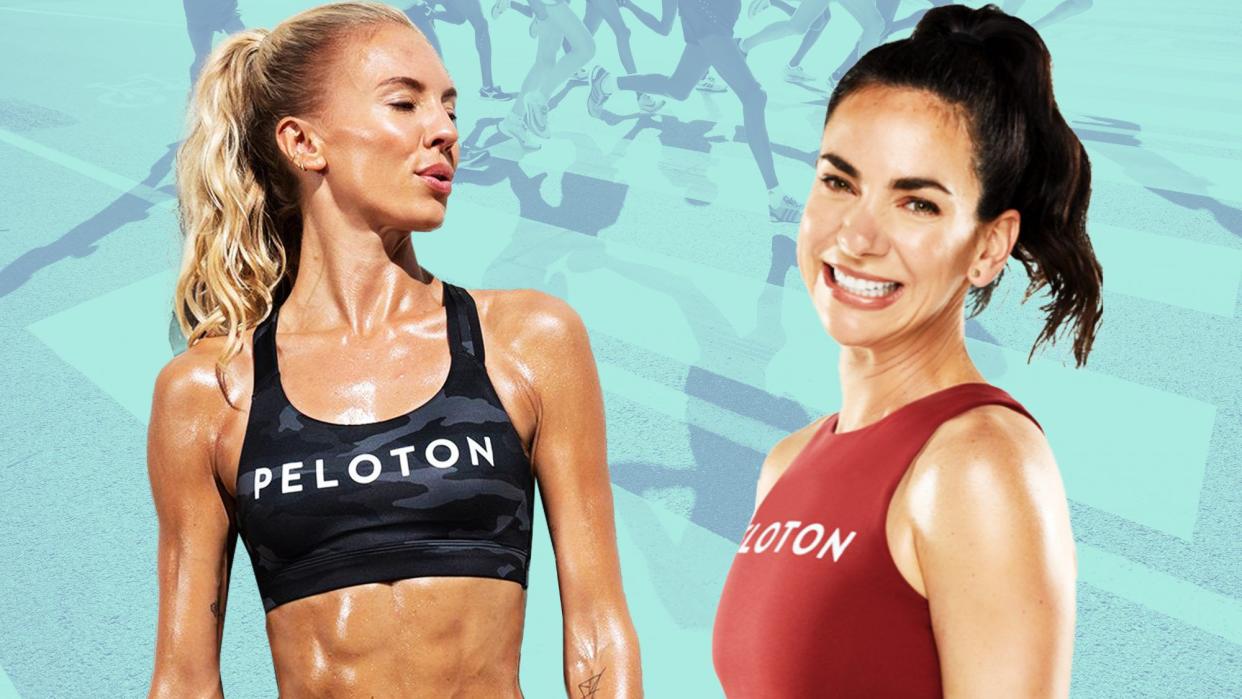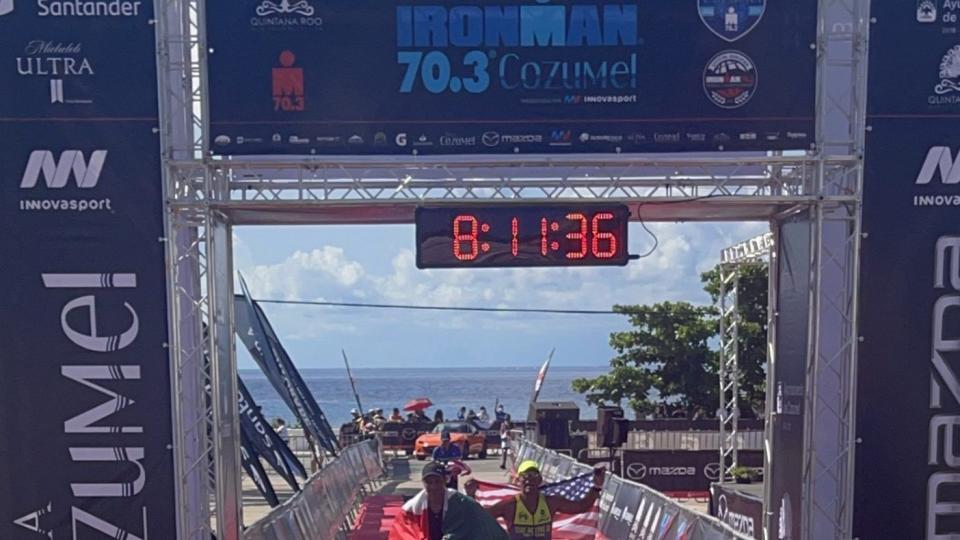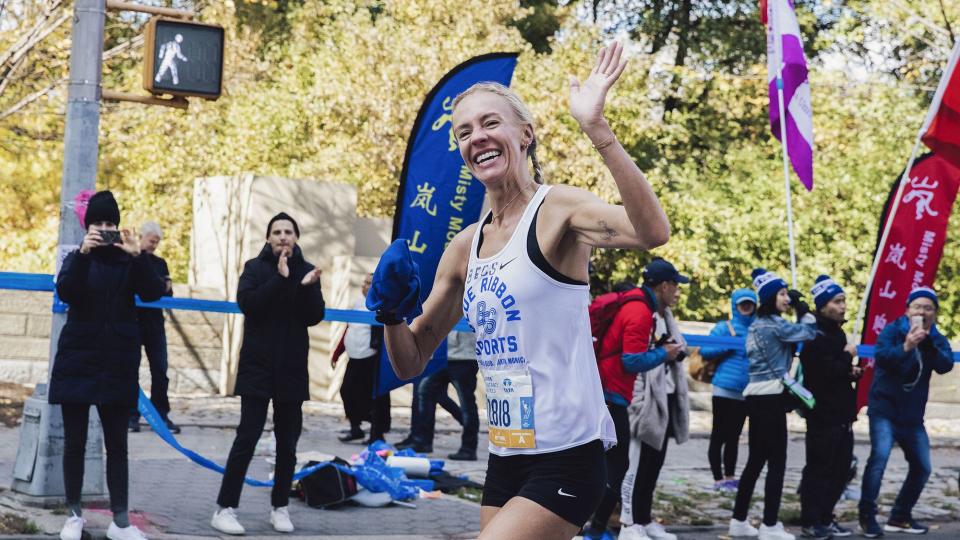How to Start Training for a Marathon, According to Peloton's Mariana Fernández and Becs Gentry

Getty Images / Peloton
This coming Sunday, about 33,000 runners will take to the streets of the famed five boroughs for the 50th TCS New York City Marathon. And whether you've run your fair share of races or are freaked out at the thought of jogging more than a single city block, you have to give it up for anyone who will attempt this 26.2-mile trek.
Those who are striving for the finish line on Sunday will be in good company: One of Peloton's newest yoga instructors, Mariana Fernández, will be hitting the pavement as well. This isn't Fernández's first TCS NYC marathon, nor is it her first major endurance competition (anyone who's taken one of her fast-paced, sweat-inducing power vinyasa yoga flows knows she's strong AF). But her approach to this year's race has evolved to include a major focus on rest, recovery, and plenty of patience.
Fernández's colleague, Becs Gentry (aka one of Peloton's most accomplished distance runners, who most recently competed at the British Olympic Marathon trials) managed to run last year's NYC marathon with a jaw-dropping finish time of 2:37:01. For reference, the average time runners completed that race was estimated to be 4:37:38 in 2017, so Gentry certainly knows a thing or two about prepping for a competition. In fact, Gentry also helped develop Peloton's dedicated marathon training program, which is available on the Peloton Tread and Peloton App. She also teaches a variety of class formats designed to help with marathon training. Think: endurance runs that help you adapt to moving at a sustained pace to build stamina, specific strength classes for runners, recovery runs that prioritize fun music, and an easy pace to help flush out tired legs, warm-ups, cooldowns, and more.
Recently, Fernández and Gentry took the time to offer their very best advice for anyone contemplating how to start training for a marathon or another running event in the future. They also have plenty of wisdom for those who've never even logged a mile (for the record, Peloton's vice president of fitness programming, head instructor, and ultramarathoner Robin Arzón didn't run her first mile until law school, so anything is possible — seriously).
Here's what Fernández and Gentry told Shape about their perspective on running, racing, and the art of embracing the experience.
Mariana Fernández
When and why did you get into running and how does your yoga practice complement running?
"I started running when we moved to the States when I was six. Mamichi — my mother — would sign up for races to keep her training for her marathons so she would put my sisters and me into kids runs as a way to get us involved. She dedicated her whole life to raising us and I remember running was the first thing she did for herself. After she would take us to swim practice on Thursdays, we would accompany her to her track practices with her coach and team. The coach was kind enough to train us and let us burn off some extra energy.
"I found yoga in college, and what started as a way to get me moving and sweating during the cold months (when it was tough to run outside), quickly became the best cross-training (which means adding in strength and flexibility workouts to complement cardio) for my endurance events. It helped keep me free of injuries and helped both strengthen and release my muscles. I also felt that my mental health improved significantly as well."
What inspired you to run the 2021 TCS New York City Marathon? How are you feeling as race day is around the corner?
"I ran the NYC Marathon in 2017 and ran it alongside Mamichi. She knew I had been through a really challenging year and we set it as our goal. I remember sharing my memories in each of the boroughs with her, I remember her being my light and crossing that finish line together. I had my 10 year anniversary in NYC this year and I thought about everything that had happened since I moved here. For me, there was no better way to celebrate that than doing the marathon again. I also dedicate each mile to someone that helped me get to that start line. I think about them during that point and that gives me the inspiration I need to complete that mile.
"The race is a few days away and I'm nervous and giddy. Some slow flows and meditation have helped keep me calm as I know I have to rest in the days leading up to it... and even though she's on the other side of the country, I know Mamichi will still be my light and help me through it. This year I am also running through the Achilles Foundation (which is a global organization that provides athletic programs and social connections for individuals living with disabilities). I run as a guide in the park with them on Saturdays and loved that I was able to raise money for this organization that is near to my heart."
You recently completed the Cozumel 70.3 Ironman — tell us a bit about that experience and how it prepped you for the NYC marathon.

Mariana Fernandez
"Wow — probably one of the most challenging events I've done in my life! I was surprised by every part of that event. The swim felt like a dream. I didn't want it to end since I felt I was swimming in an aquarium full of the most beautiful sea life. Even though I feared the distance, I enjoyed the bike and the scenery more than I thought I would. The run was interestingly the toughest part. It was hot and that part of the race really became mind over matter. There is a meditative quality in these endurance events that really allows you to dig deep, to stay present, and to face the race as a physical and mental challenge. For me, the hardest parts are the hours of training on your own... on the day of the event you feed off of the energy and how electric the city feels. It really is magic."
Did you have to change anything other aspects of your life — your diet or sleeping habits, for example — to support your training goals?
"Signing up for a triathlon or a race allows me to look up and to look forward. I easily get stuck in my own mental ruts, so they offer a way for me to take care of my physical and mental health. I love buzzing around the city, so this helps me be more mindful of what I'm eating, what I'm doing, and how to keep a certain schedule. The older I get, the more I value my sleep and recovery days. Part of what's kept me on top of my training is taking classes with my co-workers. I could not have finished that triathlon without having done Power Zone rides on the bike (the Matt Wilpers Saturday ones were the key to me finishing) or getting motivation from other Instructors. In every class, I find a gem of inspiration that I write down or keep with me so that I remember it on the day I'm racing."
What is your number one tip for someone who is just getting started in the training process for their first race? What mental or physical tool do you wish every new race runner had?
"Día con día — day by day. My mother has said this to me my whole life. Training and preparing for an event will be different every time you put your tennies on. Meet yourself with some grace. I had a few weeks before the Tri where running felt unbearable. I wasn't hard on myself. I did more yoga and meditation. I shifted gears. Eventually, running felt great again. Every single run and every single race are going to be its own experience. I recently did a 19-mile training where I cried and laughed at different points. It was very cathartic. I just make sure to smile on the event day. You've made it that far... now you just get to enjoy it."
Becs Gentry
When did you first start running, and how has your relationship with the sport changed over time?
"I started running around 10 years ago as an escape from a job that was taking all my energy. I was not enjoying the 9 to 5 and I discovered that running gave me a new freedom. I simultaneously started training at an MMA and boxing gym. My trainer was no softie and often gave me a 5K run or 2000M on a rower as a warm-up before training. This time period certainly ignited a flame and created a passion.
"Over time, running became something more of a challenge in that I knew I wanted to get better at it. I remember my first 5K race, and my first half marathon both in Brighton, UK, where I lived at the time. Today I still want to challenge my ability as a runner and I still use it as an escape or time for mental freedom, so I guess not much has changed there, aside from the fact I now get to share my passion with the world on a daily basis." (Related: How to Start Running for Beginners)
What are your top three tips for everyday energy and endurance?
"Rest and downtime are my absolute top tool for energy and endurance, not just seasonal but long term. I see runners getting obsessed over training sessions, miles output, performance… which is great as a motivator, however, I don't hear enough talk about rest and recovery being of the same importance, when in actuality they are side by side in importance for longevity and endurance as a runner. This includes rest days and daily sleep and recovery maintenance.
"Second, is knowing how you need to fuel. I am not a nutritionist, and this is totally something I apply to myself as I have tried and tested many regimes, however, understanding your body and how it breaks down fuel is integral to making your training effective. I know I am not great at running for speed on a full stomach, that is why I eat a lot in the afternoon or early evening before a hard training session and I rise very early to get it done on an empty stomach. I had to teach my body to accept fuel prior to long runs, and once I did, I saw immediate results. (See: What to Eat Before Running)
"And using at least one to two miles as a warm-up! We really are time-poor these days and try to fit so much into our days, however, once I genuinely added in these miles at a very modest pace ahead of a hard workout or long run, I noticed my breathing and mindset was in a much better place for the workout ahead."

Sara Haile
Do you prefer outside running or treadmill running? And did you do both while training for your races?
"Running on the road can have more impact on the skeletal system due to the density of concrete (pavements). Running on a tread is a softer surface, more akin to trail running and therefore slightly less impact on those joints. Running on a tread is a great way to lock into a speed or pace and sit there. It trains the mind in patience but also the body on maintaining an even speed. Personally, I find the track very intimidating, and the road very stop-start for speed work, so the Tread is the perfect place for me to work on that part of my training. For the long run, I will always say that it must be done outside unless the weather is too inclement and dangerous, as that's the bread and butter of race training."
What do you do on days when you don't feel like running?
"If I wake up feeling too tired, I will often wait until later in the day to get the session done. That said, nowadays I know that more often than not once I start moving, I will be okay. The not wanting to run is in my mind and my body… once it is warmed up, takes the reins and those notions disappear! If I am really really against running I don't. If I feel like it is my body telling me I need to rest, I listen. Missing one session is okay, just not multiple and regularly!"
What would you say to someone who's training for their first race?
"Race day is just another run."

